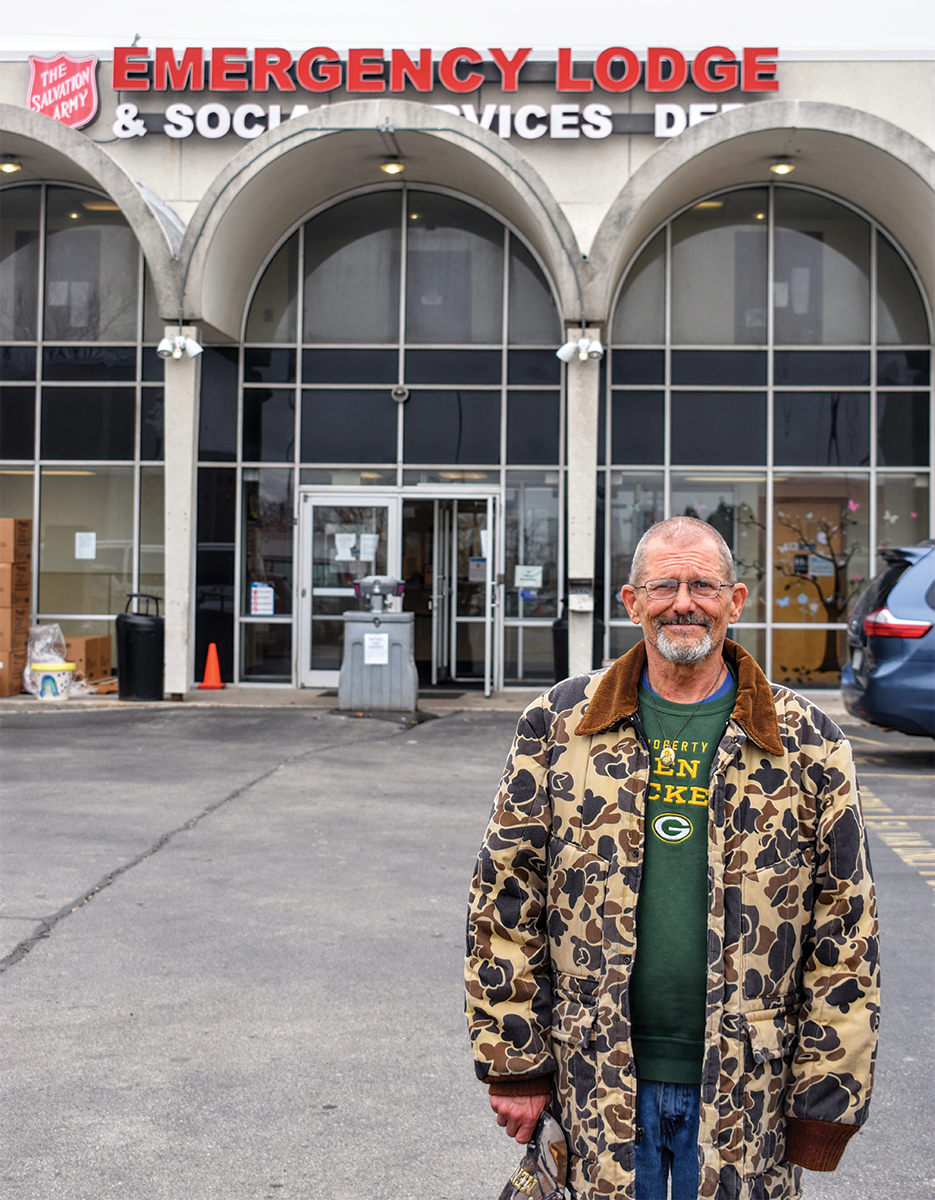Matthew’s Story: From Tent City to The Salvation Army
“I might not be alive if it weren’t for coming here. I learned how to survive here more than anywhere else.”
Matthew Spankowski, 59, wasn’t always homeless. Before he stepped into The Salvation Army of Milwaukee County’s Emergency Lodge, he had a place to live, he was married with two kids, he had good health, he had a car and he had a job.
But then, life just happened.
After his divorce, Matthew moved in with his father to save money while working and became his caregiver. He ended up staying long-term. Then there was the accident.
While riding a motorcycle in Milwaukee, he was t-boned at an intersection by someone who was texting and driving, as well as speeding. He hit his head on the pavement and his legs were crushed under his motorcycle.
“I lived through it. I know there is a Lord because I should have been dead,” he said. “I know he’s keeping me here for something.”
After his father was diagnosed with dementia, Matthew couldn’t take care of him anymore because of his own medical issues. He had to put him in a nursing home.
“I had to leave the apartment because I couldn’t afford it by myself since I wasn’t working at the time,” he said.
It was the middle of winter, but Matthew started sleeping in his car.
“I learned how to live different. It was a kick in the pants when I became homeless. I always had a good job, a brand-new pickup truck, always had motorcycles, road bikes and dirt bikes. It was a shock to me.”
One night, when Matthew was sleeping in his car on Milwaukee’s east side, he heard a knock on his window. The police were called, and they told him to move. After that incident, Matthew was directed to the Milwaukee Rescue Mission. While staying there, Matthew’s car was stolen. It was found four days later but was totaled.
“Everything inside was gone too,” he said. “All my pictures, my paperwork, medical records, birth certificate, bike and family heirlooms. I couldn’t afford the insurance, which I had always paid, so the car was completely gone.”
After two months at the rescue mission, Matthew said he walked out because he couldn’t deal with the memory of losing his car. It was then that he followed someone he met who was living in Milwaukee’s Tent City, a homeless encampment, located under the I-794 freeway west of 6th Street between West Clybourn and West St. Paul Avenues.
“I lived there in a tent all summer,” he said. “Ninety degrees, pouring, mud, outhouses. It was not much fun, I’ll tell you that much.” Matthew lived in Tent City from May to October three years ago.
“I had a big tent, but it was still kind of miserable,” he said. “At tent city I was doing a lot of drinking, figuring that was going to cure my depression even though I was told it was a depressant and wouldn’t help cure it.”
When the City of Milwaukee started issuing eviction notices to Tent City at the end of summer, Matthew said he was approached by Guest House and they introduced him to The Salvation Army. October third was his first day at the Salvation Army Emergency Lodge.
“I just never thought there was a place like this. I had a lot of depression when I first came here because I had lived with my dad for so long and lost all of my belongings,” he said. “They helped me spiritually, mentally and physically because I was going down the tubes quick.”
At the Emergency Lodge, Matthew lived with a roommate in the respite center. He took advantage of all the programs offered—including men’s group, counseling sessions and going to church at The Salvation Army’s West Corps in Milwaukee County.
“I’ve gone [to church] in a bad mood, but I’ve never left there in a bad mood,” he said. “[Pastor Sanhty] is a saint to me. When I look at him there’s like an invisible aura around him. This man is touched.”
Residents of the lodge must be drug and alcohol free, work with a social worker to develop an individualized plan for self-sufficiency establish income and save 80 percent of their income to prepare for their own home.
Matthew said his caseworker helped him apply for disability, set up medical appointments for his hepatitis and cirrhosis, and worked with him to find a place to live.
“I never thought about applying for disability until I got here. It will help me out with housing and everything else.”
Matthew, who called Milwaukee’s east side home for 35 years, is now living in West Allis, Wisconsin and says he is happy and healthy. He intends to stay connected to the Army’s West Corps, something made easier once services resumed in person beginning on Easter Sunday.
“I might not be alive if it weren’t for coming here,” he said. “I learned how to survive here more than anywhere else.”
Amy Hand is director of Media Relations for the Army’s Wisconsin and Upper Michigan Division.







